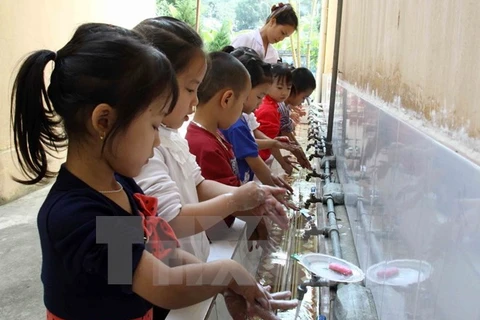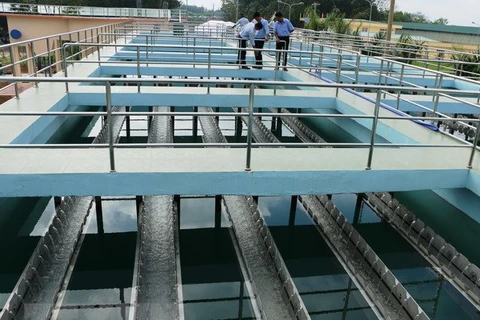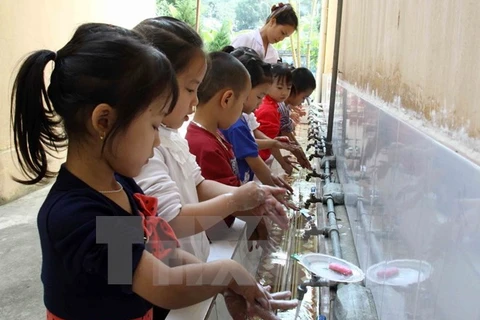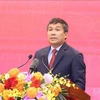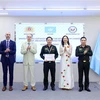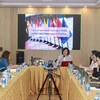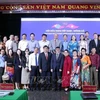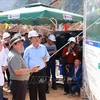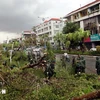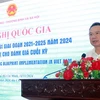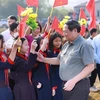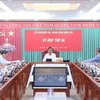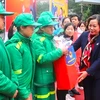Bac Ninh (VNA) – The Ministry of Agriculture and Rural Development and the People’s Committee of northern Bac Ninh province held a conference on September 21 to review clean water management and set future orientations.
Speaking at the event, Deputy Minister of Agriculture and Rural Development Hoang Van Thang said clean water management in rural areas still faces challenges such as rising population, worsening water environment pollution, climate change and poor State management on clean water.
Director General of the Directorate of Water Resources Nguyen Van Tinh said over the past years, the State, international organisations and people nationwide have made important contributions to rural water supply and improving people’s health.
With the support of the United Nations Children’s Fund (UNICEF) over the past four decades, the rate of rural dwellers accessing clean water has soared from 36 percent in 1999 to 88.5 percent now. Roughly 44 percent of rural residents (over 28 million) have accessed water from concentrated water stations and the remaining from household-scale works.
At present, there are 16,300 water supply works nationwide in service of 44 percent of the rural population, 5,653 of which work stably, 35,552 operate inefficiently and over 2,000 fail to work, affecting about 800,000 people, or 1.25 percent of the rural population.
As of late 2016, the rate of people accessing water from small-scale works accounted for 56.55 percent of the country’s population, mostly in the Central Highlands (75.6 percent) and the southeast (35.3 percent).
Tinh pointed out shortcomings in the process of fulfilling goals in the national strategy on water supply and rural hygiene until 2020 and the United Nations Millennial Development Goals on rural water supply, including slow enforcement of policies and private involvement in water supply works, yet-to-meet-demand planning on rural water supply in localities, limited public awareness of the effort due to inefficient communications and climate change hurting water quality and reserves.
The meeting reviewed mechanisms, policies and private involvement in rural water supply as well as management on community-based water supply works.
It set the goal of supplying clean water to 90 percent of rural residents by 2020 and 90-95 percent during 2020-2030 period.-VNA
Speaking at the event, Deputy Minister of Agriculture and Rural Development Hoang Van Thang said clean water management in rural areas still faces challenges such as rising population, worsening water environment pollution, climate change and poor State management on clean water.
Director General of the Directorate of Water Resources Nguyen Van Tinh said over the past years, the State, international organisations and people nationwide have made important contributions to rural water supply and improving people’s health.
With the support of the United Nations Children’s Fund (UNICEF) over the past four decades, the rate of rural dwellers accessing clean water has soared from 36 percent in 1999 to 88.5 percent now. Roughly 44 percent of rural residents (over 28 million) have accessed water from concentrated water stations and the remaining from household-scale works.
At present, there are 16,300 water supply works nationwide in service of 44 percent of the rural population, 5,653 of which work stably, 35,552 operate inefficiently and over 2,000 fail to work, affecting about 800,000 people, or 1.25 percent of the rural population.
As of late 2016, the rate of people accessing water from small-scale works accounted for 56.55 percent of the country’s population, mostly in the Central Highlands (75.6 percent) and the southeast (35.3 percent).
Tinh pointed out shortcomings in the process of fulfilling goals in the national strategy on water supply and rural hygiene until 2020 and the United Nations Millennial Development Goals on rural water supply, including slow enforcement of policies and private involvement in water supply works, yet-to-meet-demand planning on rural water supply in localities, limited public awareness of the effort due to inefficient communications and climate change hurting water quality and reserves.
The meeting reviewed mechanisms, policies and private involvement in rural water supply as well as management on community-based water supply works.
It set the goal of supplying clean water to 90 percent of rural residents by 2020 and 90-95 percent during 2020-2030 period.-VNA
VNA

